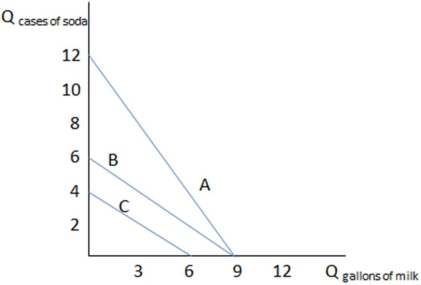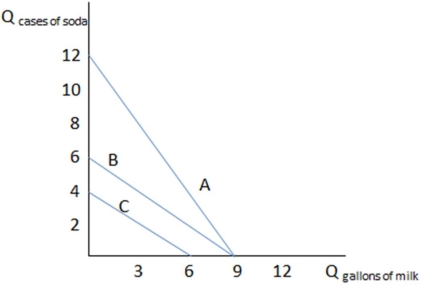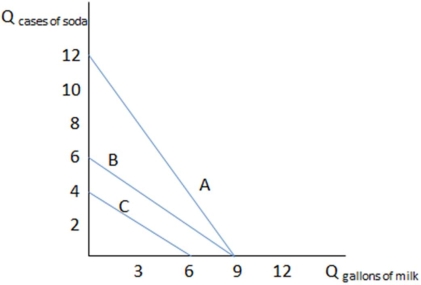A) $2 per cone.
B) $1 per cone.
C) decreases as Jack increases the amount consumed.
D) $5 per cone.
Correct Answer

verified
Correct Answer
verified
Multiple Choice
If Bob has one piece of gum in his mouth,he gains a utility of 12.If he adds a second piece to the first,it yields a marginal utility of 6;adding a third will bring marginal utility of 1.Adding a fourth piece will make Bob choke,yielding a marginal utility of -4.We can say:
A) Bob's total utility from chewing four pieces of gum would be 23.
B) Bob's total utility will decrease if he chews the fourth piece of gum.
C) Bob's total utility will be maximized if he eats two pieces.
D) Bob's total utility decreases after the first piece of gum.
Correct Answer

verified
Correct Answer
verified
Multiple Choice
Bart is seen standing in front of the cooler that contains containers of iced tea and lemonade.Moments later,we see Bart drinking iced tea,and we conclude Bart is getting more utility from that drink than lemonade.We drew that conclusion based on what economic concept?
A) Revealed preference
B) Utility minimization
C) Satisfaction scales
D) Rational behavior
Correct Answer

verified
Correct Answer
verified
Multiple Choice
This graph shows three different budget constraints: A,B,andC.
 If Don has budget constraint C in the graph shown,what is the trade-off he faces in terms of the two goods?
If Don has budget constraint C in the graph shown,what is the trade-off he faces in terms of the two goods?
A) Two cases of soda for every three gallons of milk
B) One case of soda for every one and a half gallons of milk
C) Three cases of soda for every four and a half gallons of milk
D) All of these accurately reflect Don's tradeoff.
Correct Answer

verified
Correct Answer
verified
Multiple Choice
Dave and Buster play two games of tennis,then decide to go have lunch.This type of decision making can be explained using the concept of:
A) the income effect.
B) the substitution effect.
C) diminishing marginal utility.
D) income maximization.
Correct Answer

verified
Correct Answer
verified
Multiple Choice
This table shows the different combinations of goods that Jack can consume,given that his income to spend on these two items is $10.  Considering the information in the table shown,if Jack decides to consume bundle D,we can conclude that Jack:
Considering the information in the table shown,if Jack decides to consume bundle D,we can conclude that Jack:
A) is not maximizing his utility.
B) still has money left to spend.
C) could consume more of both goods.
D) All of these are true.
Correct Answer

verified
Correct Answer
verified
Multiple Choice
This table shows the different combinations of goods that Jack can consume,given that his income to spend on these two items is $10.  Considering the information in the table shown,Jack's total utility from consuming bundle D would be:
Considering the information in the table shown,Jack's total utility from consuming bundle D would be:
A) 1,160.
B) 1,300.
C) 950.
D) 2,220.
Correct Answer

verified
Correct Answer
verified
Multiple Choice
Alison is deciding how to spend the next hour.We ask her to rate the utility she would get from an hour of each activity.She would get utility of 4 from an hour of reading,utility of 2 from an hour of playing video games,and utility of 6 from shopping.Based on this information,economists could predict that Alison will:
A) read.
B) play video games.
C) go shopping.
D) do nothing,since none of the activities give her utility greater than 10.
Correct Answer

verified
Correct Answer
verified
Multiple Choice
A utility function is:
A) a formula for calculating the most utility a particular person can derive.
B) a formula for calculating the total utility that a particular person derives from consuming a particular good over a particular time period.
C) a formula for calculating the total utility that a group of people derive from consuming a particular good.
D) a formula for calculating the total utility that a particular person derives from consuming a combination of goods and services.
Correct Answer

verified
Correct Answer
verified
Multiple Choice
This graph shows three different budget constraints: A,B,andC.
 If Joe has budget constraint C in the graph shown,what is the relative price of three gallons of milk?
If Joe has budget constraint C in the graph shown,what is the relative price of three gallons of milk?
A) 2 cases of soda
B) 4 cases of soda
C) $12
D) $9
Correct Answer

verified
Correct Answer
verified
Multiple Choice
In general,the income effect of an increase in the price of a normal good:
A) will cause the individual to buy more of that good because they have relatively more income.
B) will cause the individual to buy less of that good because they have relatively less income.
C) will cause the individual to buy more of that good because they have relatively less income.
D) will cause the individual to buy less of that good because they have relatively more income.
Correct Answer

verified
Correct Answer
verified
Multiple Choice
The marginal utility gained from the consumption of successive units of a normal good:
A) tends to decrease.
B) tends to increase.
C) may increase or decrease depending on the cost of the good.
D) tends to stay the same.
Correct Answer

verified
Correct Answer
verified
Multiple Choice
After watching a movie,Alan chooses not to watch a second and goes for a walk instead.Economists could explain his choices using the concept of:
A) budget constraints.
B) diminishing marginal utility.
C) income effect.
D) substitution effect.
Correct Answer

verified
Correct Answer
verified
Multiple Choice
Elijah has just eaten his second popsicle.Using the concept of marginal utility,we can say:
A) the utility he will gain from his third will reduce his total utility.
B) the utility he will gain from his third might reduce his total utility.
C) the utility he will gain from his third will likely be less than that of his second.
D) Both b and c are true.
Correct Answer

verified
Correct Answer
verified
Multiple Choice
When a person's income increases:
A) more bundles of goods and services become affordable.
B) less bundles of goods and services become affordable.
C) the bundles of goods and services that become affordable doesn't change.
D) the bundles of goods and services that become affordable must include more expensive goods and services.
Correct Answer

verified
Correct Answer
verified
Multiple Choice
Linus has just watched two hours of TV.We can say:
A) his second hour of watching TV likely reduced his total utility.
B) his second hour of watching TV likely added less to his total utility than the first.
C) if he watches a third hour it will likely decrease his total utility.
D) if he watches a third hour it will likely increase his total utility by at least as much as the second.
Correct Answer

verified
Correct Answer
verified
Multiple Choice
Sam has $200 a month to spend on either tanning sessions or rounds of golf.Tanning sessions are $20 each,and a round of golf is $40.Sam currently consumes six tanning sessions and two rounds of golf.Both tanning and golf are normal goods.If the price of a round of golf drops to $20,the income and substitution effects will cause Sam's consumption of tanning sessions:
A) to increase,since both effects predict an increase.
B) to decrease,since both effects predict a decrease.
C) to change,but the direction is dependent upon which effect is stronger.
D) It is impossible to say what will happen without more information.
Correct Answer

verified
Correct Answer
verified
Multiple Choice
This graph shows three different budget constraints: A,B,andC.
 If Bert has budget constraint A in the graph shown,what is his opportunity cost of three gallons of milk?
If Bert has budget constraint A in the graph shown,what is his opportunity cost of three gallons of milk?
A) Twelve cases of soda
B) Eight cases of soda
C) Four cases of soda
D) It is impossible to say without knowing Bert's income.
Correct Answer

verified
Correct Answer
verified
Multiple Choice
You decide to buy your friend lunch after she helped you study for your exam.This is an example of the economic concept of:
A) marginal utility.
B) altruism.
C) reciprocity.
D) a Veblen good.
Correct Answer

verified
Correct Answer
verified
Multiple Choice
Howard has just smoked a cigarette.If he chooses to smoke a second one:
A) he will experience a drop in total utility.
B) he is not acting rationally.
C) he will derive less utility from it than his first.
D) None of these is true.
Correct Answer

verified
Correct Answer
verified
Showing 21 - 40 of 97
Related Exams